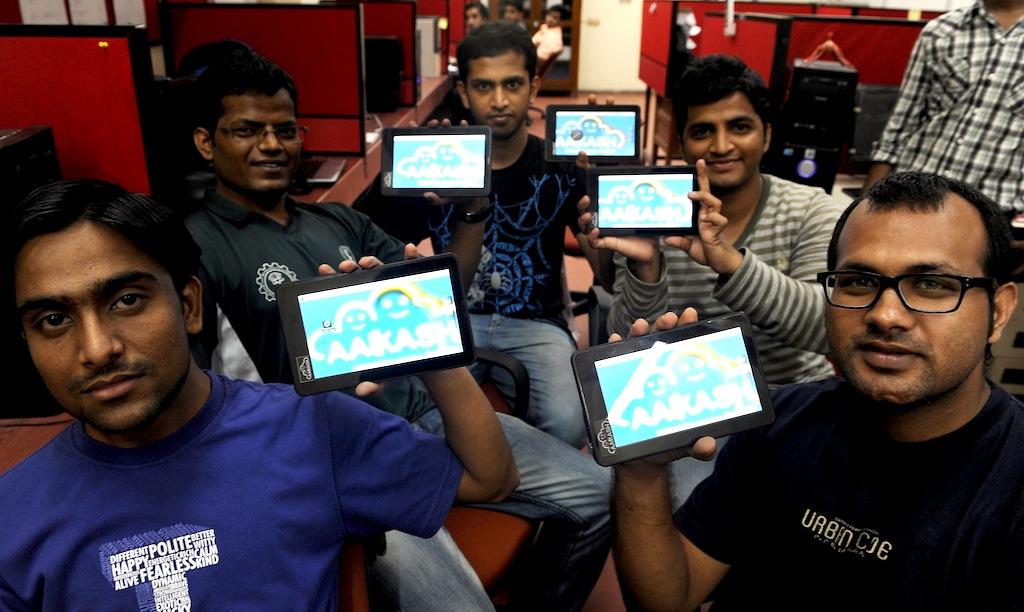Innovation, Indian-style
Indian engineers pose with the ultra-low cost Aakash-2 tablet in Mumbai on June 26, 2012.
BANGALORE, India — Silicon Valley veteran Bowei Gai and “Mr. Asia” Benjamin Joffe recently spent weeks touring India's hottest startups, meeting with founders and crunching numbers to gather information for the World Startup Report's India study.
As the founder of CardMunch (Gai) and an angel investor in numerous startups across Asia (Joffe), the tech gurus brought firsthand experience and cross-cultural insight to the project — which they shared with GlobalPost's Jason Overdorf.
The interview has been edited and condensed by GlobalPost.
GlobalPost: India's techies have already weathered one or two cycles of boom and bust. But it looks like things are on the upswing. What excited you most about the Indian startup scene during your research?
Bowei Gai: Entrepreneurs in India are very fortunate, because the country is so big. Even though most of the people are living below the poverty line, the country is big enough that you can still create a billion dollar company just focusing on a very niche area.
Consider China. It has created so many billion dollar companies just focusing on the Chinese market. I think India is no different. It's smaller than China. It's many years behind China. But definitely you can build billion dollar companies without focusing on anything else.
Benjamin Joffe: In a way, the startups that are the most successful and the largest are not technology startups the way we think of them when we look at Silicon Valley and advanced markets.
They're mostly companies that are solving fundamental infrastructure or service issues. So some of the bigger ones have a very strong offline component, and they're basically compensating for nonexistent or underperforming offline infrastructure.
GP: Why is that the case?
Joffe: A lot of companies in more advanced countries can be built on the back of existing, reliable infrastructure. But that's not the case in India. So you basically have two very different players in India. You have those solving hard problems involving infrastructure or health or delivery, and those who try to be purely online players — but there's not many of the latter.
GP: What does that mean for the startups that are succeeding in India now?
Joffe: What Flipkart [India's version of Amazon.com] is doing is not necessarily so innovative in terms of concept. But it took a lot of work to make it happen [including building a fleet of in-house delivery trucks and establishing cash-on-delivery as a workable proposition].
But if you're a pragmatic entrepreneur and you really want to change the world — if you can provide your country with good logistics you'll actually profit your country more than if you create some kind of fancy gizmo for upper class Indians.
So in a way the problems that a Flipkart is solving are a lot more serious than what's happening with an Instagram, for example.
Gai: During our meeting with Flipkart, we realized they were doing something very interesting. Maybe in the future they can open up the platform that they've built, and not only deliver their own goods but also help some of the other companies deliver their goods.
Maybe one day we'll see the next UPS or the next Fedex coming out of a company like Flipkart.
GP: From the inside, India looks to be experiencing a boom. What did you make of the investment climate?
Gai: If you come from Silicon Valley, you realize there is very, very little venture capital action and angel investor community in India. It's almost scary how small it is. So the natural reaction will be, Oh my God, it's so bad.
However, having traveled to a few more countries, you realize that it's that way most places in the world outside of Silicon Valley, except for maybe Israel. If you compare India to other countries, it's actually pretty good.
GP: Given all the brick-and-mortar obstacles impeding India's development, what impact can startups have here?
Joffe: India, just like many other emerging markets, will be able to leapfrog a lot of traditional industries we have that are very established and actually slowing down innovation.
For example, multi-brand retail in India is not very good. There's no Walmart, there's nothing like that, because of regulations. But because of that, you can actually create it online first.
We want to hear your feedback so we can keep improving our website, theworld.org. Please fill out this quick survey and let us know your thoughts (your answers will be anonymous). Thanks for your time!
